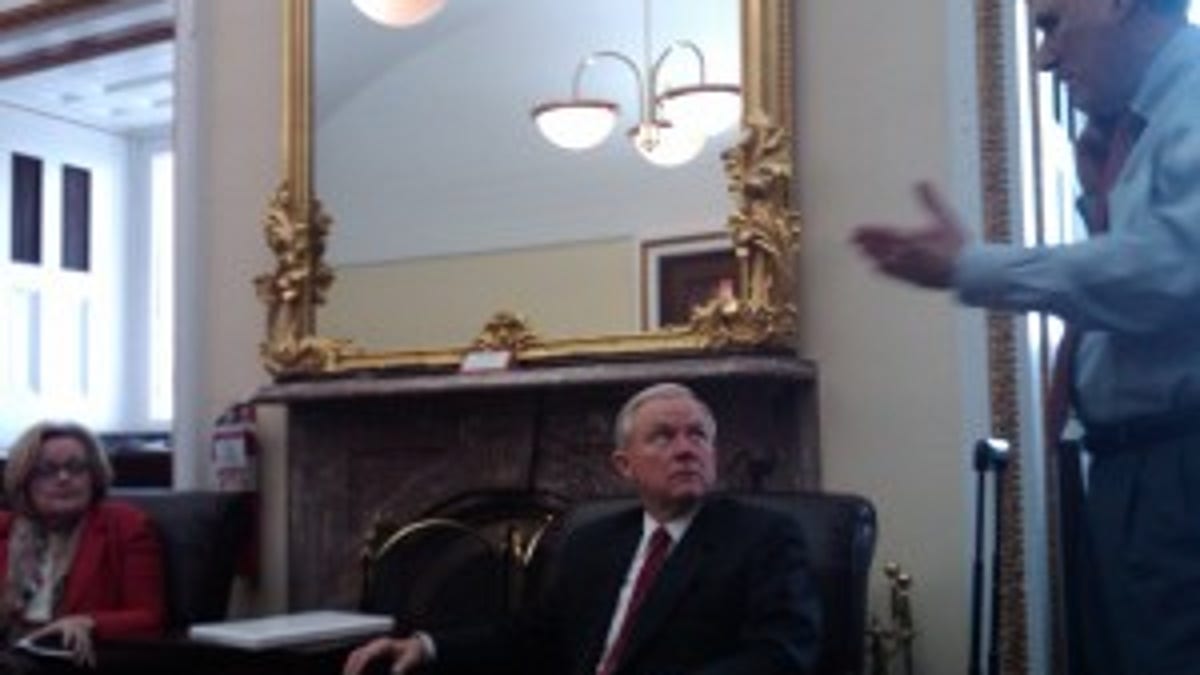
Bipartisan Group to Fight Deficits (Sens. Claire McCaskill, D-MO, Jeff Sessions, R-AL joined by Jon Kyl, R-AZ)
Bipartisanship is erupting everywhere in the Senate today. Concern about the deficit is all of a sudden quite urgent (Massachusetts just keeps on reverberating thru this place) - and it seems that senators have multiple solutions, all centering around a freeze on spending, something President Obama is set to announce Wednesday night in his State of the Union address, and something that hasn’t happened since the Clinton days.
One idea comes from polar opposites on the ideological spectrum – and it seems to have some credibility and support at the White House.
Sens Claire McCaskill, D-MO, a close Obama ally, and Jeff Sessions, R-AL, who is, uh, not, introduced an amendment that places a less than 2% cap on both discretionary and non-discretionary spending. And McCaskill said she had talked to the President, and he is “on board.”
Clearly the message today on the Hill to the White House from Democrats was: you have to look at defense funding, too!
And Republicans focused on the more than 20% increase in non-defense discretionary spending in the last two years. (Though McCaskill was quick to note, with Sessions agreement, that a big “chunk” of that was Census and veterans’ funding.)
Either way, the McCaskill-Sessions amendment, which should get a vote Thursday, takes a swing at spending and mandates a two-thirds vote of the Senate when the caps are busted.
So excited at this display of bipartisanship, Sen. Jon Kyl, R-AZ, the chamber’s No. 2 Republican, showed up to congratulate the two senators, as they spoke to reporters. He praised both members and through a verbal “bouquet to bipartisanship.”
One thing was a bit unclear about McCaskill-Sessions. There is an exception to the caps in an emergency. Sessions said “war” was an example, but McCaskill seemed to say that the current wars in Iraq and Afghanistan would NOT be exempt. The President is about to come to Congress for billions more for the troop surge in Afghanistan, so this could be problematic, if the amendment passes.
Nevertheless, McCaskill said, “I am a mid-western optimist. I think it’s going to pass.”
As for the prospects of such legislation passing in the House, where the spending power is guarded with perhaps even more zeal, it is telling that the senators knew of no companion legislation in that chamber.
Meanwhile, another slightly less shocking pair-up occurred today.
Sens. Evan Bayh, D-IN, and John McCain, R-AZ, both up for re-election this year, joined forces for a major package of deficit-reduction proposals.
The Bayh-McCain bill would enact a spending freeze at “today’s levels” and say that no new spending can be enacted (short of inflationary increases) until the federal budget is balanced. Not only that, but this bill would make the annual budget that Congress enacts “legally-binding,” requiring a presidential signature.
Spending targets would be established by Bayh-McCain; line-item veto authority would be given the President (something Congress has failed to do for years); and earmarks would be shut down until the budget is in balance. A fund would also be established to help reduce the deficit.
It is very hard to see how such a measure stands much of a chance, when Congress consistently votes down attempts to strip spending bills of earmarks; defeats a commission to fight debt; and where the power of the purse is zealously guarded by entrenched interests.




